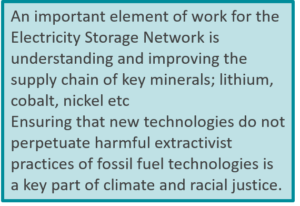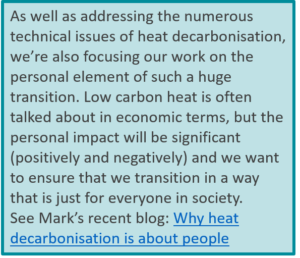Despite some nervousness writing this blog, it’s a topic I’m incredibly passionate about and I’m grateful to have had the time and space over the last year to discuss and debate with my colleagues. I acknowledge that as a white, middle class woman in the energy sector, I have little authority to talk on this issue, but I hope this adequately represents some of the conversations the team have had over the last year.
Even choosing which words to use to describe the issue is difficult – equality, diversity and inclusion have all become loaded terms which are often associated with corporate whitewashing. I prefer ‘justice’-focused terms, which put the emphasis on solutions and agency for those affected, but I’ll likely flit between several terms in this article.
Recognising the importance of diversity in energy and climate
“Regen is an organisation with an express mission to decarbonise our energy system and to tackle climate change.”
 With that mission comes the responsibility to ensure that as we decarbonise, we do so in a just way, recognising that climate justice is a key driver behind our activities. In all the work I do, I’m very conscious that many of the solutions to the climate crisis, particularly in the energy sector, are imposed by a minority through paternalistic structures, onto those who have little agency in its implementation. Part of this journey is understanding what we as Regen can do to improve that, by the work that we do and by amplifying the right voices and perspectives.
With that mission comes the responsibility to ensure that as we decarbonise, we do so in a just way, recognising that climate justice is a key driver behind our activities. In all the work I do, I’m very conscious that many of the solutions to the climate crisis, particularly in the energy sector, are imposed by a minority through paternalistic structures, onto those who have little agency in its implementation. Part of this journey is understanding what we as Regen can do to improve that, by the work that we do and by amplifying the right voices and perspectives.
Regen itself has known for many years that our sector, the energy industry, has not historically been a pioneer for diversity, equality and inclusion, and we have actively tried to change this over the years through several areas, including our women’s network, ReWiRE and constantly improving our recruitment practices to make our positions as accessible to as many people as possible.
However, like many other people across the world, the team were moved by the Black Lives Matter protests in 2020 and began to seriously interrogate and debate not just Regen’s approach, but the approach of the whole energy and environmental movement, scrutinising and acknowledging our own shortcomings as we did so.
What have we done so far?
Over the last year, we’ve been driven by a desire to learn, to grow, to question attitudes and practices, and to educate ourselves. This has taken the form of many team discussions, reading and exploring new ideas, and sharing those throughout the team, resulting in a huge set of shared resources which is constantly growing (see below for a few highlights).
We were conscious not to publish immediate statements without first taking a critical look at our own practices, thinking about our own perceptions, what issues exist in our organisation and in our industry and how Regen can take tangible action. Part of this involves looking deeply at the underlying, systemic causes of racism and prejudice as well as exploring what privilege we hold as individuals and as an organisation. Not only do we want to challenge our personal attitudes, but also the atmosphere we foster as an organisation, the work we undertake and our influence in the wider sector.
We do know that we need to challenge how we see diversity, broadening the approach from male/female gender balance (which has been a key area of focus for the energy sector in the past) to beyond the gender binary, to racial justice and diversity, socio-economic background, disability, sexual orientation, neurodiversity, to name just a few examples.
 I also want to highlight that encouraging equality, diversity and inclusion isn’t just about creating a flourishing organisation – I’m struck by how many organisations use EDI simply to ‘improve outputs’ or ‘increase profits and productivity’. First and foremost, we should have a diverse set of people around the table because they deserve to be there, but we also need to bring diverse voices into the solutions to climate change. Marginalised communities are most affected by the impacts of climate change and the solutions to it. We need to expand our tables, provide safe, open spaces for others to come in and force us to look at tackling the climate crisis in different ways.
I also want to highlight that encouraging equality, diversity and inclusion isn’t just about creating a flourishing organisation – I’m struck by how many organisations use EDI simply to ‘improve outputs’ or ‘increase profits and productivity’. First and foremost, we should have a diverse set of people around the table because they deserve to be there, but we also need to bring diverse voices into the solutions to climate change. Marginalised communities are most affected by the impacts of climate change and the solutions to it. We need to expand our tables, provide safe, open spaces for others to come in and force us to look at tackling the climate crisis in different ways.
Next steps
We want to explicitly challenge ourselves to understand what we need to change and what we can achieve as an organisation as well as what needs to change in our sector. We’re wary of jumping straight to solutions before really understanding the underlying issues – we know we don’t have all the answers yet, but we think our work will be focused on tackling the following areas:
- History: explore what has and hasn’t worked at Regen and in the energy industry
- Impact: understand how we can use our work and our position in the industry, for example by addressing climate/energy justice
- Internal practices: explore actions that Regen can undertake to encourage diversity and inclusion
- Recruitment: understand how diversity and inclusion are fundamental to a thriving, influential organisation, using this knowledge to improve recruitment of board members, team members and those on work placements
- External/events: use our outward facing role and presence to encourage and promote diverse voices, using our four-point pledge [in progress]
- Accountability: use our non-executive board of directors to question and challenge us in this area
- Communicate: collaborate with other organisations in our sector that are going through a similar journey
We also need to look at our perceptions, to understand the underlying, systemic causes of racism and privilege and how we can personally, and as an organisation, identify and explore them.
This is really just the start of the journey for Regen and we still have some way to go. We’ll be working internally to set out a plan for achieving the above and iterating as we learn and develop. We want to work with our colleagues in the sector, those we collaborate with, and anyone applying to job posts – if you have any feedback after reading this blog post, please do get in touch.
Our first step is to update our website with a statement that summarises the above, which you can find here. It’s a small step, but an important one to keep us accountable and share our thoughts and progress.
I want to see the energy sector ask itself critical questions, to learn from the huge amounts of amazing, often harrowing, testimonies of people of colour, the LGBQT+ community, disabled people, neurodiverse people to become actively anti-racist and progressive. It’s a long journey, but one I hope everyone is willing to begin.
Resources and reading
A few books, articles, podcasts and webinars that we’ve found enlightening
About Race – podcast series with Reni Eddo-Lodge
Climate of Hope – Climate Justice: A Question of Survival
Utopia podcast speaks to Leon Sealey-Huggins about climate justice and racial justice – accessible 30 min listen about racism and the climate crisis
How to Uphold White Supremacy by Focusing on Diversity and Inclusion
Arguing that the concepts diversity and inclusion do not go far enough and just allow those in power to exploit people of colour for economic benefit
Racism in the environment sector: why we must change and how we can do it
Webinar run by Green Alliance (chaired by the lovely Ravina Singh) – really useful, practical advice about a route forward for the environment sector
As black climate scientist in the USA, Ayana Elizabeth Johnson talks about how dealing with racism distracts from her work on climate, and why white environmentalists need to care about racial justice
